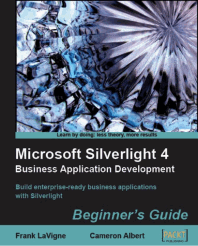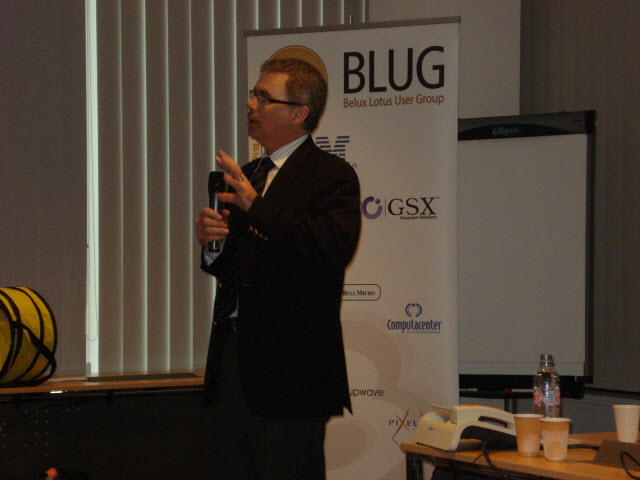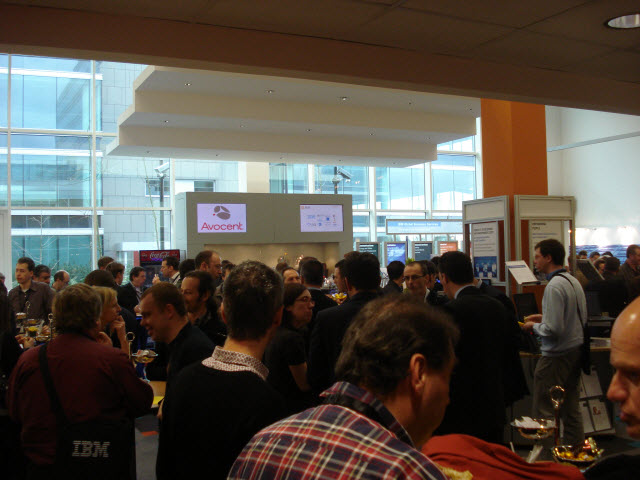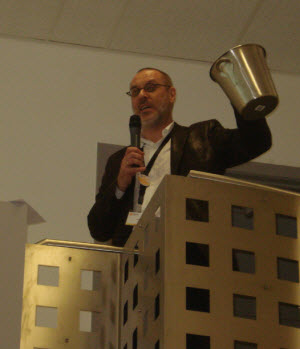Free eBooks from Packt Publishing
Packt is set to launch two free eBooks to celebrate the brand launch of Packt Open Source and Packt Enterprise. This article offers a slightly more in-depth look at what the brand launch will mean.
Packt is set to launch two free eBooks to celebrate the brand launch of Packt Open Source and Packt Enterprise. This article offers a slightly more in-depth look at what the brand launch will mean.
Seems like the well known spammer located in Amsterdam has choosen my blog for comment spam.

Akismet does a great job ( 69,466 spams caught, 336,274 legitimate comments, and an overall accuracy rate of 99.994%.) but I saw a lot of comments over the last 24 hours not filtered by Akismet. So I (re-) activated WP-Ban again and are now able to stop the comment spam (for a while).
The internet would be so much faster and even more valuable if these f**ckers would not exist.
Addins mit Java zu erstellen ist ja bereits möglich und einem Teil der ND Entwicklergemeinde durch die Vortäge von Matthias Bierl und Andy Brunner auf den EntwicklerCamps bekannt.
Jetzt tut sich auch etwas, um auch Extension Manager mit Java zu erstellen.
Aber Vorsicht, das ist noch keine 1 zu 1 Umsetzung der Möglichkeiten, die man mit C hat. Zum einen fehlen noch Ereignisse, zum anderen wird der Funktionscode wohl nicht so zeitnah ausgeführt, dass man z.B. auf Dokumente in der mail.box zugreifen kann, bevor diese geroutet werden ( soweit ich das verstanden habe )
Die fehlenden Ereignisse kann man sich aber leicht selber hinzuprogrammieren, da der Sourcecode mitgeliefert wird.
Im Übrigen wird sich die komplette Entwicklung von Addins und ExtensionManagern in Richtung OSGi bewegen. Man sollte sich also frühzeitig damit beschäftigen.
I wanted to update a virtual machine from Ubunto 9.10 to 10.04 but I could not recall the root password. None of my standard passwords worked.
Google to the rescue, I found a way to reset the root password.
1) Login as non-root user
2) sudo su –
3) type in the password for the non-root user
4) passwd
5) set new root password
Now updating to Ubuntu 10.04
During the installation and configuration I came across a problem with slide conversion. Although I had configured the system variables according to the documentation, the slide conversion did not work.
No document was converted and I therefore was not able to share documents during a meeting.
Some hours later and with the help from my Notes Buddies at the German Notes Forum ( www.atnotes.de ) I finally was able to solve this issue.
As the underlying OS for Sametime 8.5 I use Suse SLES 10.2 with Gnome. It seems that the installer does not install any JAVA JVM or JRE. After installing the JAVA 1.4.2 package, the slide conversion works now.
So, if you intend to install Sametime 8.5 Meeting Server make sure that you have JAVA installed for the slide conversion.
 I have been asked by Packt Publishing to review a new book titled
I have been asked by Packt Publishing to review a new book titled
“Microsoft Silverlight 4 Business Application Development: Beginner’s Guide“.
The book is written by Frank LaVigne and Cameron Albert and has been published in April 2010.
As always, Packt Publishing made available a free chapter for online reading. Follow the link and learn, how to “Get started” with Microsoft Silverlight 4 Business Application Development.
The book is on it’s way to may desk but maybe delayed because of the flight ban. I will post the review as soon as possible.
The behavior of compact options is changed in 8.5.2 when compact options for DAOS and archiving are used in combination. You can now use a combination of options to DAOS-enable a newly created archive database.
load compact -a -DAOS on mail\database.nsf
When an archive database is newly created during the archive, the new archive database will be DAOS-enabled.
Important to know is that the combination of compact options will not affect the mail\database.nsf database itself, or any existing archive databases.
Also, the behavior of compact does not change when the otions -a and -DAOS off are used together.
One of the features that are missing on a Nokia device whne using Lotus Notes Traveler is the ability to remotly wipe the device in case of the device has been stole or got lost for some reason.
Nokia now offers the Lotus Traveler Security enablement library to activate remote security features. Go to the bottom of the linkes page for further information.
The is supported according to standard Nokia device support process and works on the following devices:
Nokia E50, Nokia E51, Nokia E52, Nokia E55, Nokia E61i, Nokia E63, Nokia E65, Nokia E66, Nokia E70, Nokia E71, Nokia E71x, Nokia E72, Nokia 90 Communicator, Nokia 5230, Nokia 5530 XpressMusic, Nokia 5800 XpressMusic, Nokia N97
After registration for ILUG 2010 has opened its e-doors yesterday, I received the approval of my registration at 02:03 am today.
I immediately booked the flights and reserved a room at the conference hotel.

If you want to stay at the conference hotel, it is a good idea to mail your reservation request ( reservations@ramadabelfast.com ) because booking via the website is not possible as all rooms are blocked during the conference. Maybe there is some other “trick” but mailing the request was the easiest way for me.
“We’re pleased to announce that, better organised than ever (honest), we’re going to open up registration for ILUG on April 6th. So get your attendee, speaker and sponsor details ready!”
Follow this link for further details.
Here are the slides from my presentation on DAOS at the BLUG conference on 30-Mar-2010 in Brussels, Belgium.
Thanks to all who attended and gave feedback either by asking question or filling in the evaluations.
BLUG started for me on monday afternoon when driving from my office to Brussels.Took me about 3 hours for 250 kilometers. Arrived at the hotel at 7:00 pm where Theo and some of the conference speakers already sat at the bar and had a beer or two.
After I was introduced by Theo to Belgian beer, we went downstairs for the speaker’s briefing and a dinner. After more beer and a lot of conversation, Day 0 ended at 1:30 am.
The night was short but somehow I managed to move my body to the breakfast room at 6:30 am.
Later on, I put Tim Clark, Paul Withers and Martin Leyrer into my car and we drove to the IBM Forum Brussels. The first thing we saw was the yellow Lotus car in front of the building.

The conferenc started with a keynote speech from Alistair Rennie followed by Laurent Boes talking about the latest Lotusphere announcenents in complement to the OGS.

The breakout sessions started after a short coffee break. The forum staff did a great job in dividing one big room into 3 for the upcoming sessions. The technical staff was always available to fix minor problems or get the microphone to work properly.
All sessions were well attended. The developer track had 3 sessions in a row about XPages. The rooms was crowded; no surprise is that.

My session on DAOS went well, although I was a bit nervous because of the fact that I had never before spoken at an international conference.
Thanks to Theo for immediate response of what attendees said about my session.
 The bar opened at 4 pm and Theo raffled sponsor’s giveaways. ( T-Shirts, books, umbrellas and even a license for a Ytria EZ suite).
The bar opened at 4 pm and Theo raffled sponsor’s giveaways. ( T-Shirts, books, umbrellas and even a license for a Ytria EZ suite).
Back at the hotel, we had at least 30 minutes to change clothes before we drove downtown Brussels. Beer, wine and great food were a perfect closing of a perfect day.
We celebrated Matt White’s 8th blogging anniversary. Don’t know what the waiter was thinking when we start singing “Happy blogging .. “.
Thanks again to Theo and the team ( IBMers and Non-IBMers ) for making this conference a great and successful event. It was also a pleasure to meet the other speakers.
FP2 for Notes and Domino 8.5.1 is available for Download on FixCentral.
Next week on 30-March-2010, BLUG starts. This FREE, one day event will take place in the IBM Forum, Bourgetlaan 42, Zaventem (Brussels).
According to an email I received yesterday, there are a few seats left. If you have not yet registered, go ahead and grab your seat … NOW!!
If you cannot make it to the conference, you can point your browser to www.blug.be/liveblogging to follow along. Live Blogging will start on Tuesday around 9.00h (CET).
I’ve been asked by PACKT publishing to review a new book Grok 1.0 Web  Development.
Development.
Grok? Who or what is Grok?
“Grok is a web application framework for Python developers. It is aimed at both beginners and very experienced web developers. Grok has an emphasis on agile development. Grok is easy and powerful.”
Grok 1.0 Web Development is written by Carlos de la Guardia and has been first published in Feb 2010.
The book is intended for developers more or less familiar with the concepts of web applications who want to write their applications using the Python programming language. No familiarity with Zope is assumed from the start. The approach is practical, focusing on getting working code right from the beginning.
What you will learn from this book
The author does a great job explaining a very, very complex software system. A lot of the Zope specific details were left out as this was a book on Grok, but when the detail was required, it was very simple to digest and understand.
As always, there is a free chapter available for your reading pleasure. Chapter No 5 : Forms. You can also order the book following this link.
I tried to get the auto-populate group feature to work in one of our branch offices, but always got a
“Search for auto-populated group members failed for group TEST.: Error looking up name on LDAP Server; See server log for further details.”
error message. I finally gave up because I could not figure out, why the feature did not work on this server.
After migrating the server from Windooze to Linux, the error still occurs and I finally found the cause for the failure.
Directory assistance is running on the server and we have 5 additional address books enabled. One of this address books is not derived from the PUBNAMES.NTF template. And this is it. So simple, isn’t it?
When I disable the address book in question, the autopop feature works without any issue.
Although there is a technote that says that “private” address books can be problematic, directory assistance worked for us for us without any problems.
Here is my presentation on “C/C++ API for Beginners” for download or online reading.
Enjoy!
Migrated a Windooze server to Linux today. The files on the server are DAOS enabled and I wanted to get the number of files in the DAOS repository and the overall filesize.
Here is a small shell script that does the job
#!/bin/sh
REPOSITORY=/local/daos
OUTFILE=/local/daos.txt
fCount=`find $REPOSITORY -type f | wc -l`
fSize=`du -ksb $REPOSITORY`
IFS=”/”
array=($fSize)
fDate=$(date +”%d-%m-%Y”)
echo $fDate / $fCount / ${array[0]}>> $OUTFILE
On a daily basis, triggered by cron, it appends a new line like this one to the file defined in the OUTFILE variable
12-03-2010 / 26235 / 18743907789
You can now use the file to create charts with Dojo for example. Maybe there is a better way to accomplish the aim, but this works for me and perhaps it is useful for someone else.